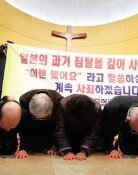Outright copycats for making presidential pledges
Outright copycats for making presidential pledges
Posted January. 24, 2022 07:59,
Updated January. 24, 2022 07:59
The ruling Minjoo Party of Korea’s presidential candidate Lee Jae-myung uploaded a post on Facebook to pledge deduction carried forward for five years on capital loss of virtual assets and tax exemption for investment earnings up to 50 million won for the sake of reasonable taxation for virtual assets. Earlier, the main opposition People Power Party’s Yoon Suk-yeol made a promise to increase the upper limit on tax exemption for virtual assets from 2.5 million won to 50 million won – the same level as that for stocks. Right after Yoon announced a set of virtual coin pledges, Lee competitively responded by even promising deduction carried forward.
It is increasingly obvious that presidential candidates copy one another’s pledges. Some add more benefits to their competitors’ original version while others publish almost exactly the same pledges. In particular, this phenomenon prevails when they have some particular interest groups or generations in mind to target their needs such as the increased bar on tax exemption for virtual assets. Most cases involve cash-paid or policy-wise support initiatives.
The same happens with the pledge to increase the ranks’ monthly pay up to two million won. Earlier this year, Yoon left only a single line of his promise to get rank-and-file soldiers paid up to two million won by 2027 on his social media as if he had felt embarrassed by copycatting Lee’s pledge. Once Yoon promised to increase tax returns by raising personal allowance in time for year-end tax adjustment, Lee immediately acted to announce a plan to expand tax deduction for year-end tax adjustment by applying a special income tax deduction of one million won a year. When Lee released his cash-supported plans of allowances for prime-aged generations (1.2 million won a year) and basis income for artists (1 million won a year), Yoon rushed to promise to give a 600,000-won voucher benefit to pregnant women so that they can receive treatment programs on baby blues.
A series of real estimate policies published by Lee and Yoon, the key to the victory of the upcoming presidential election, is surprisingly similar in that they make the same promise to increase house supplies. Although they both announced to build 2.5 million units initially, Lee on Sunday made an update to supply 3.11 million units across the nation to make a slight difference from Yoon’s blueprint. However, their infrastructure investment policies still look alike each other given that both of them promised to lessen regulation on floor area ratio for reconstruction projects in Seoul and place underground Seoul-Busan Highway and urban rails such as Gyeongin Line and Gyeongbu Line to secure housing sites in the capital area. They deliver the same message to raise the current supplementary budget of 14 trillion won to 35 trillion won.
It is a shame that leading candidates brazenly emulate their competitors’ plans and initiatives, make tweaks and bluff with larger figures to lure voters to their side. They seemingly think that it is not a big deal to take a thorough and reasonable look at any details of financing or policy feasibility as if they were absurdly blinded by their eagerness and desperation. Unprecedently, the lineup of candidates for the upcoming presidential election ignores the significance of verifying their policy manifestos.







